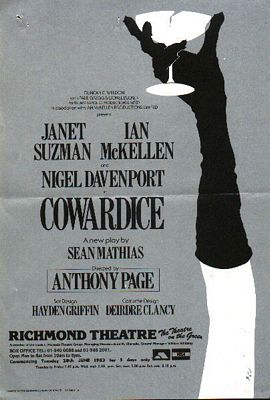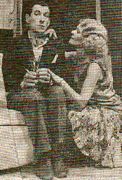COWARDICE by Sean Mathias
Venue: Richmond 1983
Directed by: Anthony Page
Venue: Richmond 1983
Directed by: Anthony Page

Cast
Janet Suzman
Ian McKellan
Nigel Davenport

Review
On transfer to the Ambassadors
Janet Suzman
Ian McKellan
Nigel Davenport

Review
On transfer to the Ambassadors
Once upon a time in the West End, the star-part of a play was almost a genre in itself. Playwrights often wrote them for spouses: Marion Lorne, Constance Cummings, Hugh Williams. The trouble is that nowadays you need a little intellectual weight, and preferably social concern, to flesh out the glamour. To give your leading man and whoever is doing the leading lady the chance to preen as Noël Coward and Gertrude Lawrence they have to be unemployed theatre buffs living in a dream world.
So, in the theatre where the Master gave a celebrated prompt from his stage-box on the opening night of Hay Fever and fumed when Gingold and Baddeley went a bit too far in Fallen Angels, Ian McKellen and Janet Suzman now play a brother and sister in a Peckham basement rehearsing a Cowardish play, supposedly dictated by Sir Noël from the grave, with champagne bottles full of supermarket ginger ale. He was a teacher, she is an actress (“the definitive Nina if only it had come to town”) who dropped out of a knighted thespian’s company and now visits his Belgravia pad to pleasure him while he recites Prospero. Whereas Boy and Babe, for such these children are called, defend the theatre as “magical entertainment”, Sir (Nigel Davenport) has marched into the video-taped theatre market and, along with all the old disdain for television that the Ivy must have been hearing for decades, attaches no special importance to the great classical roles or the theatre in general.
Sean Mathias, the author, is an actor and how much it shows in this nostalgia for something that many of us love, but not in this way. That, however, is as much point as the play has; that and the related interplay between theatrical fantasy and the reality of meeting fellow-actors in the dole queue, shopping trips pilfering sardines, even an attempt to carry into Private Lives the squalid world of incontinent old women and a paraplegic squashed by a bus in his wheelchair. Though briefly fuelled by the interest of Sir’s presence on the Arts Council and his influential voice on whether Boy’s play Public Death (Coward is clearly recycling titles for present use) might be selected for the Kennington Festival, the action, like the protagonists, is all dressed up with nowhere to go.
Knowing references abound: Janet Suzman enters drawling about her divorce from Victor and Maudie’s marvellous party, and “on a very clear day you can see Victoria Station” scores double for bouncing off a Coward anecdote as well as the line in Hay Fever that it relates to. Miss Suzman, and how loyal of her to take the part, gets periodic nervous confrontations, the unfunniest funny story of the year (about the Queen falling into a pond) and a dryly-played finale when she puts on a Beethoven tape and smothers Mr McKellen Desdemona-style. He, on his side, gets a don’t leave me pathos bit, a nervous breakdown or two, a cigarette holder and some pastiche Coward songs by clever Martin Duncan which are good enough to get away with.
Anthony Page gets the director’s billing and the question: Why?